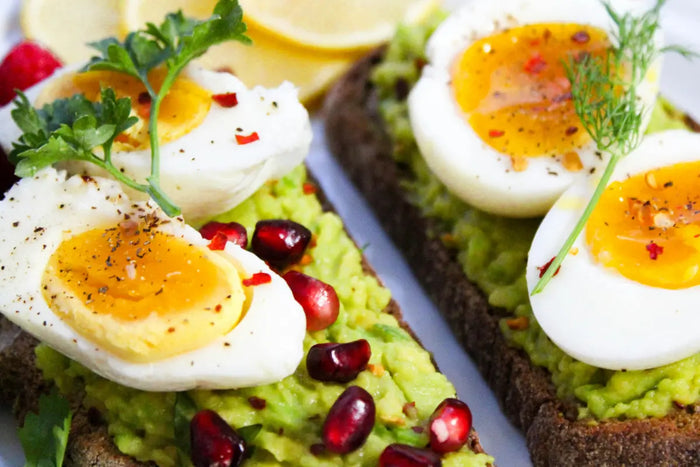Health is wealth, right? With the rise of healthy eating habits and well-being routines trending it would seem health is at the forefront of people’s minds. Health is such a vague term, ranging from mental health to physical health. But today we’re here to talk about specifically your gut health.
Something that people used to shy away from talking about, but with the rise of TikTok gut health trends as well as the increasing availability of gut health supplements and probiotics for gut health to support your digestion such as The Digest Capsules, gut health is becoming less of a taboo subject, and more a day-to-day thing we want to openly talk about. So, what is gut health, how does it affect you and what can you do to improve it?
What is gut health?
Some people may think that your gut is just your stomach. But it’s the centre of your health, and includes your whole gastrointestinal system. Your gut health is determined by the types of bacteria in your gut and the levels of those bacteria in there. The gut includes organs that take in the liquids and food you consume to then break down for your body to use as tissue repair, energy, and growth. This system goes from your mouth to your large intestine and rectum. The gastrointestinal system also includes the organs such as the pancreas, salivary glands, and liver. If you don’t take care of your body and gut, then your entire health can be affected.
Symptoms of poor gut health.
There are several ways your body can be impacted by poor gut health it’s known that gut health is linked to mental health and can even affect someone’s personality, as well as showing physical symptoms of pain and discomfort. If you’re struggling with never really having any energy, then that also could be a sign of poor gut health.
1 in 5 people in the UK experience this first symptom at some point in their life, and that IBS (irritable bowel syndrome). This is a chronic disorder that can make you feel like poop, quite literally. An upset stomach is the main symptom of IBS, but people can also experience symptoms of constipation and general stomach bloating, abdominal pain, and feelings of serious illness. Bloating is another common symptom of IBS and poor gut health.
Another symptom of poor gut health is unintentional changes in your weight. Having an unhealthy gut can mean that your body struggles to regulate blood sugars and the absorption of vital nutrients as well as the storage of fat. This could result in your weight changing without your intention. Something that could be missed as a poor gut health symptom is irritated skin. If your gut is inflamed, you could end up experiencing symptoms of eczema.
Studies have also shown that your gut health and bacteria could have an impact on your personality. The bacteria that lives in your gut is called microbiome and this is what is linked to your brains behaviour. Dr Katerina Johnson of Oxford University’s Department of Experimental Psychology has found that numerous types of these bacteria are associated with autism and variation in social behaviour.
Gut microbiota studies have also shown that your gut could determine whether you get Covid-19 and how bad you experience symptoms in the long run.
Symptoms of good gut health
Let’s not dwell too much on the negative of gut health, because it’s not all bad. You can see some really positive symptoms of good gut health.
Not all bacteria are the bad kind. There are about 40 trillion bacteria in your body and most of those are found in your gut. The good kind is called bifidobacterial. These help your gut to digest fibre, produce healthy chemicals and prevent any infections.
If you have tip-top great health in your gut you will find yourself with high energy levels every day, as well as seeing results of clearer skin (although hormones and stress can affect your skin so don’t worry if your skin isn’t great that doesn’t necessarily mean your gut health is poor).
A healthy gut also means you will experience pain-free regular bowel movements as well as a normal amount of gas and bloating and you should find you have mental clarity.
How your diet effects your gut health
Everything you put into your body has an impact on your gut health, you are what you eat right? Of course, this comes with good and bad impacts. There are foods that aren’t that great for improving your gut health. It’s recommended that you should reduce your intake of dairy, as it can unbalance your gut and can decrease the number of good bacteria in your gut. Gluten is not the best food for gut health. You should look to reduce it, as it can increase how permeable your gut lining is and leads to many issues. Highly processed foods can also increase inflammation in your gut and increase your risk of developing colitis and metabolic diseases.
However, don’t just cut everything out of your diet, there are lots of gut health foods to improve your gut health naturally. Starting with probiotic foods such as yogurt. Although we want to reduce dairy, we don’t want to cut it out completely. Yogurt is jam-packed with friendly bacteria that will help support better gut health.
Kefir is especially great for improving your gut health, it’s a fermented probiotic milk drink that helps you not only to protect yourself from infections but also improves gut health. This one isn’t for the faint-hearted though, due to the natural live culture’s kefir is often fizzy and tastes fairly yeasty, but with all the gut benefits it gives you it’s certainly worth the experience of drinking it!
Sauerkraut is another fantastic, fermented food. Popular in Germany, sauerkraut is shredded cabbage that has a sour pickled type of taste. It’s often served with sausages or as a side dish. It’s full of probiotic properties, along with vitamins C and K. It’s also high in fibre which can reduce bloating, so all around a good option.
The effect that exercise has on your gut
Changing up your diet isn’t the only way to improve the health of your gut. Exercise is a great way to help improve your digestion and can help you to stop bloating, as well as enhancing the number of good bacteria in your gut. When you work out, your body temperature rises, and your blood flow redistributes. This is suspected by researchers to be the best conditions for your good bacteria to thrive. By allowing your good bacteria to flourish you are creating a diverse microbiome in your gut.
There are several ways you can make your workout gut friendly. If you focus on cardio exercises that increase your heart rate and increase the blood flow around your body. This helps with your diverse microbiome we mentioned previously. Make sure your being consistent. As tempting as it may be to stop working out, if you give up you won’t see the long-term benefits to your gut. Don’t be afraid to starting small with your workouts. If you don’t exercise regularly, you’re not expected to delve straight into running a marathon. Start off with a walk, and gradually build up the level of cardio you are doing. The idea is that you’re providing a fuel source to your microbiome by constant exercise, so whether that’s a walk, jog, or sprint either way you’re fuelling your microbiome.
Your sleep can affect your gut health too
Your sleep and your gut health go hand in hand. If you have a lack of sleep, you can cause stress on your body which can be a cause of several issues with your gut. But equally, if your gut health is poor, it can affect your sleep.
Recent studies have found that the diversity in your microbiome has coincided with longer sleeping patterns and better sleep efficiency. Studies also show that when there were more antibiotics in the gut, serotonin levels were down and this interrupted sleeping patterns, inducing stress and poorer gut health. So if you put together a diet with the best foods for good gut health you may just find you sleep better.
Ready for a healthier you?
You now have the recipe for gut health success. Top takes from this are, that your whole gut and mind are connected. If you improve your gut health, you improve your overall health. Make sure recognise the symptoms of poor gut health and listen to your body. If you are incorporating the best foods for a healthy gut, and fuelling your microbiome with exercise, as well as getting the sleep you need, then you have all the right elements for an all-round healthier you.
References
Saha. L (2014) - Irritable bowel syndrome: Pathogenesis, diagnosis, treatment, and evidence-based medicine. Click Here
University of Oxford (2020) Gut bacteria linked to personality. Click Here


















